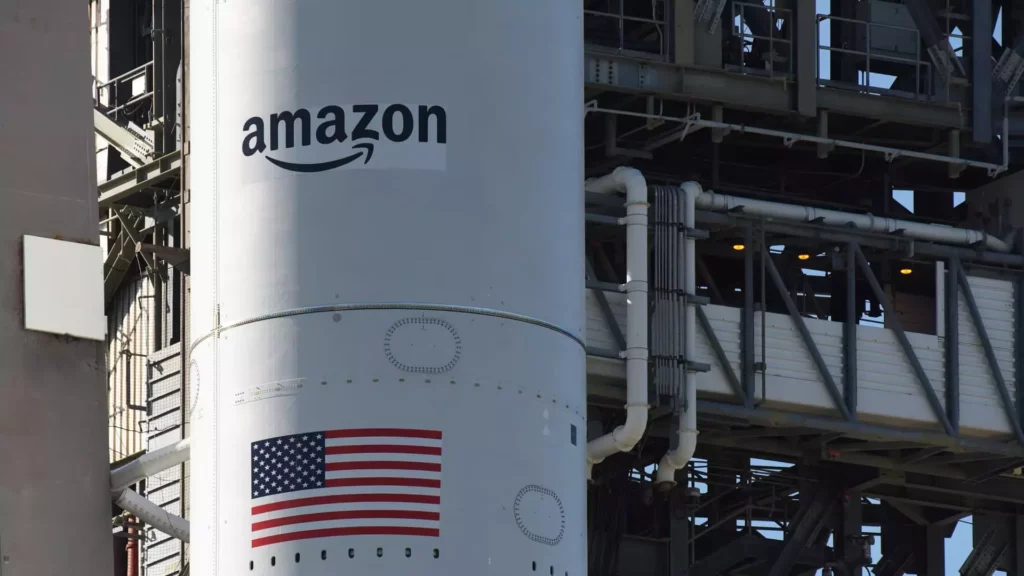In an increasingly digital world, the stakes for ambitious projects such as Amazon’s foray into satellite internet cannot be overstated. Recently, the company faced a setback when its planned launch of the Kuiper internet satellites was postponed due to inclement weather conditions. This misstep, enveloped in “stubborn cumulus clouds” and unpredictable winds, is a microcosm of the larger issues plaguing the aerospace sector. For a company like Amazon, which has poured resources into its space endeavor, the delayed countdown is not merely an inconvenience—it is a blatant reminder of the capricious nature of space exploration. The aviation industry is laden with unpredictability, and if Amazon hopes to make significant strides, it must acknowledge and prepare for these variables.
A Competitive Race Against the Clock
The urgency of Amazon’s satellite project has never been more pressing, particularly when viewed against the backdrop of fierce competition from SpaceX’s Starlink. With thousands of satellites already operational, SpaceX has established itself as the front-runner in providing satellite internet service. The clock is ticking for Amazon, which must deploy approximately 1,618 satellites by mid-2026 to keep pace. Falling behind could compromise Amazon’s market position and investor confidence, transforming it from a tech titan into a mere footnote in the burgeoning satellite internet landscape.
The strategy behind the Kuiper project is not solely technical; it represents a significant socio-economic initiative aimed at addressing a pressing digital divide. However, this commendable vision collides with the hard realities of execution. Any delay can jeopardize the transformative potential for communities needing reliable internet access for education and healthcare. Thus, every setback is a reminder of the broader mission at stake—providing a lifeline to those lost in the digital ocean.
The Political Landscape: A Double-Edged Sword
In the realm of tech innovation, it is not just the technology that matters; political maneuvering is also a crucial element. Elon Musk’s SpaceX has effectively leveraged relationships within the current administration to secure vital governmental partnerships, bolstering its reputation and market influence. Amazon needs to learn from this savvy political playbook. The tech giant is not just competing with satellites but is also embroiled in a political landscape that could determine the success of its connectivity initiatives. The ramifications here extend far beyond simple market share; they touch on regulatory hurdles, funding opportunities, and the overall ecosystem surrounding space innovation.
Amazon’s hesitation to aggressively forge political alliances could endanger its satellite ambitions. By failing to align with governmental interests, it risks losing advantageous partnerships that further SpaceX’s dominance. To thrive, Amazon must embrace a more proactive political strategy that complements its technological pursuits.
The High Stakes of Execution
As Amazon reflects on weather-induced delays, it faces significant pressure from stakeholders to expedite future launches. The company’s reliance on United Launch Alliance (ULA) for subsequent deployments exemplifies its commitment to learning and quickly adapting to setbacks. However, such plans must be untangled from the unpredictability that comes with any space mission.
The tech behemoth is not merely racing to meet deadlines; it is racing against the narrative that will shape public perception. Each delay could solidify the idea that Amazon may become “just another player” in a field it aspires to dominate. This perception, if left uncorrected, may harm investor confidence, impacting future funding and innovation potential.
The Path Ahead: Resilience in the Face of Adversity
While challenges loom large, they also provide a canvas for Amazon to showcase its resilience and ingenuity. The company’s ability to navigate through these unpredictable hurdles will define its trajectory in this new market space. To stake its claim in the satellite internet arena, Amazon must not only remedy the setbacks but also cultivate an image of a determined and adaptable innovator.
The coming months will reveal whether Amazon can pivot swiftly and transform setbacks into strategic advantages. The potential for Kuiper to redefine accessibility in impoverished regions is tantalizing; however, the road to that vision is fraught with risks and competition. What Amazon does next could very well determine not just its fortunes but potentially reshape the future of how we connect in a digitally interconnected world.









Leave a Reply